- The AIMS scientific team
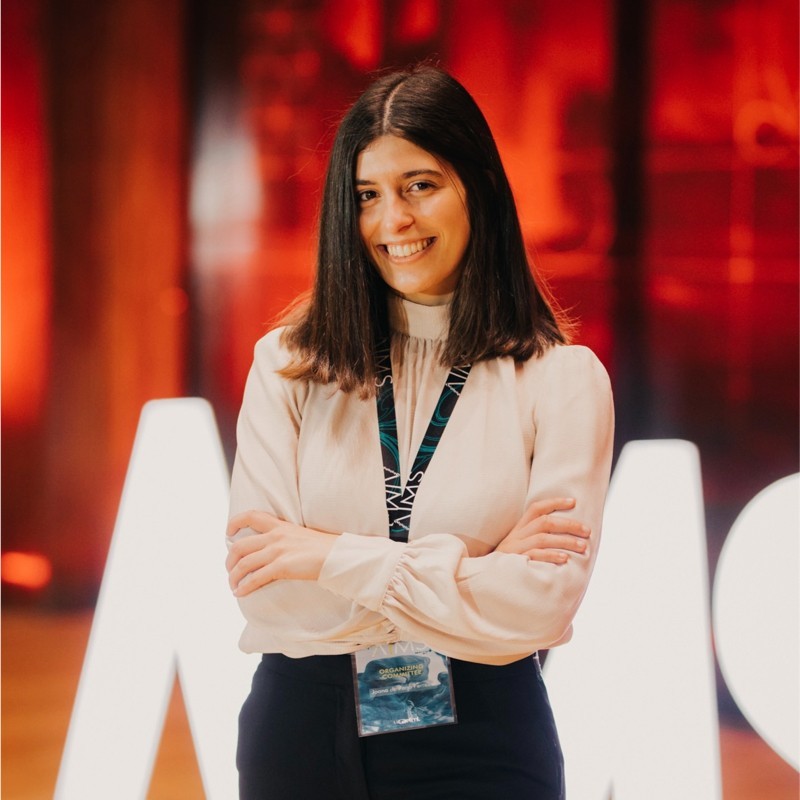
Ever since Joana de Pona Ferreira took over the coordination of AIMS, she was ready to find links between the largest congress of Biomedicine and the Faculty of Medicine. A discreet leader who, however, is never completely absent from her role as caretaker of the team, I agreed with Joana on the fairest way to keep echoing the work of a team made up only of students and that was taking on a new challenge, organising a congress that was once again face-to-face, but now keeping in mind that digital had already entered everyone's lives. And so the concept of a "two-in-one" AIMS was born, which once translated into work was almost mixing two projects with a single team.
And so we got to know each other, step by step. One stage at a time, the most important moments for each situation on the agenda were announced.
The proposals were never forgotten by Joana, and several were the trips we made to the teams and the works. The last conversation just happened now.
To finish in apotheosis, the last conversation kept all the pairs of the Scientific group, except for João Pires because it was his birthday. After exchanging ideas on the possibility of a physical or digital meeting with everyone, we realised that we would never be able to meet before 9pm. After days of so many exams and tests, to give up some time of personal life would be, in fact, everything but giving up time, it would be gaining new time of a group of people who gave everything for a common ideal, perhaps greater than each one of them. At least they would prefer us to say so.
Monday at 9pm, everyone was on time and already back from internships and last classes, waiting on a Zoom date.
Meeting some acquaintances, or some new faces, there is always a mark across AIMS, an immense desire to overcome barriers and not to accept the word "impossible". The arrogance of the inexperienced ones? Neither arrogance, nor inexperience. After all they are the great driving force of the part of the future that they manage to show us now, through the Scientific Department team, which brings AIMS on stage once again this year.
Henrique and Nuno are my first contact people. They were responsible for the module "The Day after", on the last day of the congress, March 13th. They needed to find the right speakers, they didn’t want to talk about Covid-19 just to repeat so many concepts already learned. The outlook had to be positive, despite the negative aspects and collateral damage, but even in the face of crisis, there are always lessons to be learned.
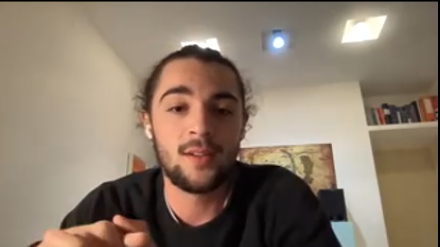
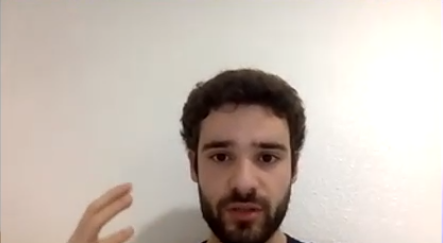
Closing the cycle of four great days of debates and lectures, they decided on themes that focused on learning and research. They therefore wanted to focus on one question, "How will Covid-19 change medical research in an unparalleled way?", they both explained to me. In less than a year of laboratory research a vaccine has emerged, there will also be other drugs, but in a more humanitarian version, because it was not only health that the pandemic attacked. So what spread throughout countries beyond the pandemic? "Professor Ben Ramalingam strongly focuses on finding in the most fragile countries the adaptive leadership concept, showing how to use leadership and make decisions in record time, with consequences for the populations", explained Nuno, who added: "We didn't want to talk about the pandemic just for the sake of it, we wanted to talk about the turnaround and the adaptation suffered in various areas, about what will be our future as doctors".

The search for deeper insights into these areas was the general motto of this AIMS team. Will the concept of the pandemic have gone by the day of "The Day After" module? "Probably not", Henrique and Nuno answered. In fact, the post-pandemic is more valuable than having the actual answer to this question, and for this intrigued duo it happens at the moment when perceptions are already seen and understood by most people.
They are very focused on how to make the theme appealing to public opinion, more than on the theme itself, but they hesitated in the face of such a topic that so many times was the only one on the agenda and that was so for 2 years. "It could become something heavy, but what we managed to do was to find guests who could talk about all the elements of the pandemic, without being informative and assuming a more inspirational register," Henrique told us. "We just don't want to go down the path of the slogan "everything's going to be alright", because we know that it's not like that", Nuno stressed, "we all enjoyed pretending that reality, but now it's no longer possible".
"It’s an open wound, but different for everyone", he continues to explain, the fact is that "everyone has built up their own vision of the pandemic and to build a module like this, you have to try to understand what the pandemic has been for each of the different people", he concludes.
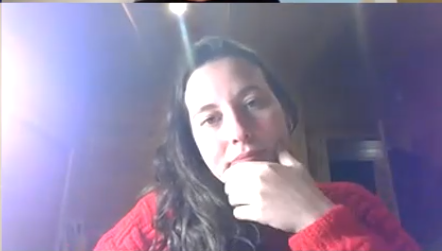

We already knew each other from other talks, Andreia and Raquel focused on the Reaching Balance module, an area closely linked to Endocrinology and Nutrition. With three lectures on this big theme, the approaches promise to drift afterwards to the intestinal Microbiota in health and the consequences at brain level, as well as its functioning. Hormone therapies in transgender care will be one of the debates, and finally the impact of different ethnicities on health and disease and how these can manifest themselves, the coordinator and coordinate explained.
In such a variety of topics and approaches, I wonder if they can take the pulse of the audiences, listening to the public for the selected areas, but there is something new in this group that in previous times did not happen. Already in the 3rd year of MIM, the truth is that they don't know what face-to-face AIMS was until then, as a result of the pandemic and social distance, the groups became aseptic in mass contact and sharing as they were barred from face-to-face gathering. Measuring, therefore, the audience's reaction will have to be part of inherent common sense and intuition alone.
The anxiety of the arrival of the right time makes them manage their own expectations. Both are affable as they are prudent. Will the audience give a standing ovation, or acclaim to that figure they considered to be central, or will it fall short of what had been idealised? These are their thoughts.
Raquel can tells us about it, she has always admired doctor Henry Marsh and perhaps it was because of him that she was inspired to study Medicine, but now that she's made it, what will it be like to bring in one of the keynote speakers at AIMS? What will the moment be like? I inquire the expression of a genuine smile. "It all comes down to such a quick moment. And the thing is, most of the time, we don't even get to hear 'our speakers' because we are helping other departments with other tasks, however, as we now have the recorded sessions, we will then be able to satisfy that curiosity and watch it later."
An intensive year of work is then reduced to a fragment of 4 days, in which time flies without any warning or a chance to be properly enjoyed.
The reward of arriving at the great moment of the event and going through it at cruising speed does not erase the sense of a wish fulfilled, mission accomplished and the satisfaction of having worked out well as a team.
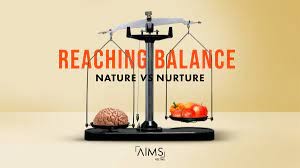
A situation that does not need to be lived to know which one will be the most emblematic; each one of them knows which is the highlight of the program. Raquel isn't discouraged by the fact that she probably won't be able to hear Henry Marsh live, but she sees things through a glass half full, "it's always us from the team who accompany our guests to lunch, it will already be an excellent opportunity to get to know them better. This is after we have spent months exchanging countless emails and arranging everything with them."
Ricardo teams up with João (who is absent because is his birthday). The two lead the Custom-Made module, which aims to show a new medical paradigm, that is, that Medicine should be focused as much as possible on the patient, but always adjusting to the personalisation of each one, creating specificities and details of their areas, thus allowing a very exclusive relevance. The internist working at Apple - Lauren Cheung - is an example. The impact of technology on health is her theme, being one of the people behind the creation of the Apple Watch. Because having a heartbeat sensor in a watch, or the ease of being able to take an electrocardiogram in a few seconds, in a smartwatch, could be the beginning of a much wider and more rooted connection of the market with people. Ricardo elaborates on the idea, "let's put two lectures together that can complement each other quite a lot". A British doctor, from the National Health System, Sir Mark Caulfield, where the genomes of 100,000 English people have already been mapped. As we know, there are several companies that show us our predisposition to a certain disease, but this doctor has coordinated an innovative project on the impact of mass genetic mapping on the personalisation of health care.


We bring in another researcher who is not a doctor; he's an incredible speaker, Edward Perello, who is going to make us think a lot about the question: "So what now? To what extent can we alter someone's genome, so as not to generate a very serious disease? And what is the limit to not being able to choose the genetic formula that changes the colour of a baby's eyes?".
An interesting game of ideas and ethical principles, the 12th day will bring its own challenges and provocations to the stage.
I ask Ricardo for help in reflecting how far introspection or the real expression of interest of an entire class can go. Is AIMS the gateway to topics that have not been debated enough and that can stir human minds? "I think the truth is that, even if these questions of ethics have been addressed in our classes, there is much to be discussed and we need to excel, more than applying things as they are", he continues. Inspired and inspirational, Ricardo understands that it is someone's motivation that always makes us want to challenge knowledge, to go further than the content already outlined. "If I do something that works really well, it's likely that in a few years' time I'll be the one invited and go to a big congress."
Diogo is a silent patient. He teams up with Raquel for the Keynote Lectures and is part of the restricted group that launches the most isolated challenges, which allows contact with areas that are as theoretical as they are more pragmatic and motivational.
Entrepreneurial and global, the AIMS always questions itself if this will be the most interesting congress because of its content, or because of the list of participants and speakers.
Perhaps less used to working in a team, now that he remembers the dynamic of working with Raquel, Diogo knows that AIMS does not only change the themes and speakers every year, but also the people who organise it. "We change too, in fact any experience we have changes us as people, and of course AIMS causes even more inner impact".
AIMS is, therefore, the path of clues for the future, "we can only benefit from this event, because it makes us work in areas that are more and less intuitive for us. I'll give some concrete examples", continues Diogo, "whether we work in entrepreneurship, public health, or biomedical research, it brings us into contact with so much. Everything is put into perspective".


This is Henrique's first year on the AIMS Commission. Already in his 5th year, Henrique knew that this would be his ultimate test, "because then there would be no more time, it was now or never. And I didn't want to hesitate any longer. It was worthwhile joining this team and accepting the challenge. I wanted to get out of my comfort zone, that's the only way you feel you can grow and that experience makes you do things differently.”
For Nuno, the same idea was even stronger, "none of us wants to be just a mere participant, there is a will that makes us want to transform our last year of Medicine into something different and remarkable. The way we want to transmit and build someone's thoughts, the sense of wanting AIMS to pass as a message to someone is also very strong, because we feel it as a mission".
The legacy they want to leave to their own and peers, they want to fight against misinformation and provide the debate of more global ideas and visions. "I can say certainly that there have been conscious and unconscious changes in me", he concluded. And if Nuno and Henrique are almost at their final destination, Andreia is in the 2nd year, which allows her to deal with scientific realities that she would not deal with so quickly. Another strong ambivalence of the AIMS project is to know that it has grown a much more emotional structure, "I know now that to obtain something you have to run after it and insist a lot. That I learned at AIMS, as well as being less formal, 'nagging' people more and asking them for response, feedback. A while ago I wouldn't have recognised myself in this form. I’m not so shy anymore." She explains with a smile.
Knowing how to harmonise opinions and behaviour is another great learning experience that seems to be common to all. Knowing how to listen to opposing opinions and even then having to give their own, having the discernment to apply the best resolutions, whether they agree or not, are techniques that will no longer be lost amongst them.
A principle applied and defended by the now general coordinator, Joana, who often says that "AIMS gives much more to us than we give to AIMS", this idea passed from generation to generation with other previous coordinators and this translates the extreme dedication to the project, but receiving a greater return in terms of learning and individual growing. Raquel and Diogo are the proof of that, this year both are coordinating the Scientific Department, they know that more than giving a lot of themselves, it is believing in the group that will bring the complete return and keep the signature of this Biomedicine congress. "Now that we have experienced the AIMS, it still allows us to have perspectives of careers that we would not have before", reasoned Raquel.
Balancing forces between different years of the course, Ricardo and João are a good match – one already does the clinical years and the other will soon be doing it. That's also what AIMS is, a multicultural and integrative gathering of themes, people and experiences.
They never stop wanting to surpass the goal of the previous year and the fact is that they succeed. Thinking that no more or better could be achieved, the truth is that the best always comes and is saved for last.
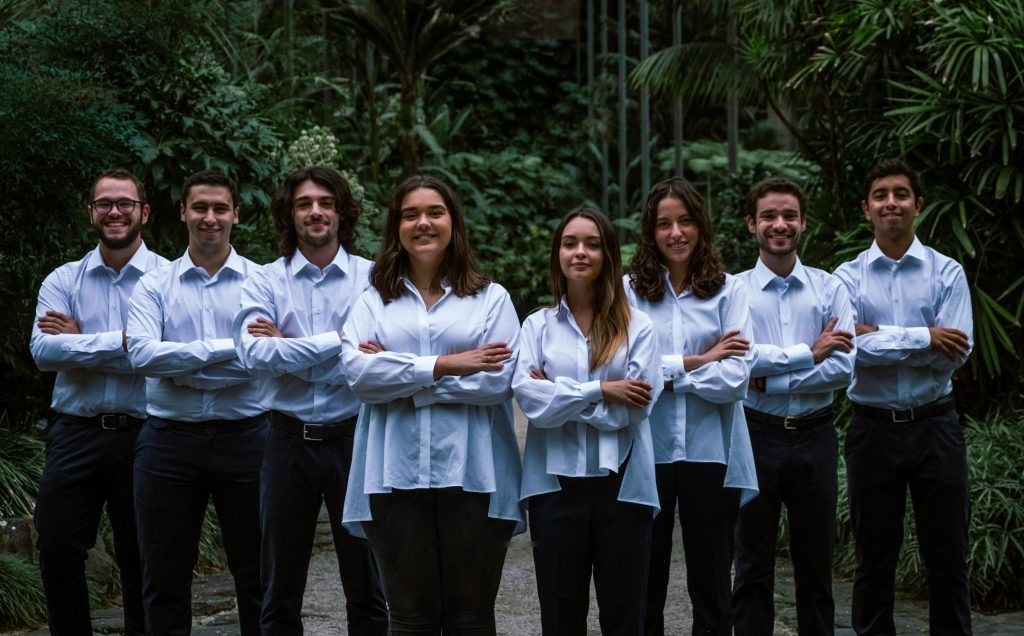
As a farewell to a committed team full of dreams, we asked them what "The Day After" would be for them personally. The moment was of a long expected silence, as if only then they would come to their senses and ask themselves "What do you mean, but is AIMS really over for us?".
After the event the group and the work will tend to slow down. So will the file updates and the message exchange chats. Some are already more on their own, others continue the hectic pace among classes, exams and practices, and everyone will say goodbye to a full time family, the family that now embodies again the initial characters. Among the tiredness, the achievement and the critical sense to analyse what they could have done better, more individualistic, or more dependent on routines, this was a group of dreamers who had the courage to risk it and put their dreams to the test, however shy they were and afraid to reveal it.
Good luck to you all, we will be here to applaud you!

